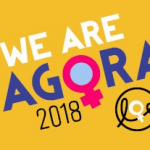A leak of thousands of non-consensually shared sexually explicit images reveals the tip of the iceberg of ‘Revenge Porn’ sharing platforms in Ireland. While new legislation has been proposed to tackle the issue, the sharing of these images often has less to do with ‘revenge’ than with a deeply-rooted culture of image-based sexual abuse.
When we think of sexually explicit images – nudes – getting leaked online, we think of the dark web, corners of the internet that are so out of reach, we couldn’t find the images if we tried. But that’s not always the case.
On November 17th over 6,000 nude photos of Irish women and children were leaked from a discord server composed of roughly 500 members. These images included child pornography, copyrighted property from the paid platform OnlyFans, and images of adult women who shared their photos in what they thought was privacy and confidence.
Up until now, there has been no legislation in Ireland to address what has come to be known as ‘Revenge Porn’ – the non-consensual sharing of pornographic content that was acquired via personal relationships. This provided a legislative loophole through which perpetrators could share this kind of content without facing any legal consequences – whereas to accuse someone of sharing revenge porn could amount to defamation, which is illegal.
Looking back, this was a display of dominance, a sign that there was no line that would not be crossed, no intimacy too sacred that these boys – these unremarkable, normal boys -would hesitate to use this tool to control and elicit fear in the women they knew.
With a petition that has collected over 60,000 signatures online in the past week, a bill on ‘Revenge Porn’ has been proposed to be brought into Irish legislature. While this is surely worth celebrating, it should not be considered an all-out victory. If the discord leak has displayed anything, it is that there is a deep and prevalent culture of image-based sexual abuse in Ireland.
While the notion of a platform used for this purpose shocked many as horrific and unheard of in recent memory, the only thing unique about this discord group was that the men behind it got caught.
The concept of mass-sharing of privately acquired nudes was first introduced to me in the smoking area of my hometown’s nightclub when I was still underage. A boy, well-liked among our peers, showed me his phone. On the screen, in the Facebook messenger app there was a group chat which, as he scrolled, I saw had over a hundred members – boys my age, some that I knew. In this chat, I learned, they swapped nudes they had received from girlfriends past and present, girls they were texting, girls that were my friends, that I had grown up with and gone to school with.
There was nothing about the way this boy showed me his phone that suggested this was a secret or some discreet project. On the contrary, he had the pride of a child showcasing a new toy. He passed his phone around the table we were sitting at and I watched on in disbelief as every other boy who saw the screen nodded or smirked in recognition at what they saw.
To this day, I can’t quite place what the undercurrent of enthusiasm coming from this boy had meant. He may have been basking in the sheer entrepreneurship of the group, thinking that I would applaud them for their organisation and teamwork. I couldn’t shake the feeling however, that he was relishing the uneasiness he had so clearly invoked in me. Looking back, this was a display of dominance, a sign that there was no line that would not be crossed, no intimacy too sacred that these boys – these unremarkable, normal boys -would hesitate to use this tool to control and elicit fear in the women they knew.
The men sharing these images are not faceless figures from the depths of the internet – they are men we know, and at some point, came to trust. They are men we were in relationships with who made the decision to share images of us that have the potential to ruin our lives.
When the news broke of the discord leak, Irish women on social media were up in arms in disgust at, among other things, the sheer size of the operation – and my mind wandered back to that night. I thought of how in my small hometown, among just one clique of underaged boys, there existed a group chat of similar stature that even at the time was regarded by its members as commonplace.
I use this anecdote because the extent of these group chats on Facebook, Whatsapp, Discord etc. may never be known. The radio-silence of Irish men on this issue however, in my honest opinion, is strongly suggestive of just how many of them casually facilitate or partake in these platforms – proportionately reflected by the universal experience among women of having at least one friend that has had an image of themselves circulated online without their consent.
The non-consensual sharing of women’s nudes among friends and strangers is likely normalised beyond any fathomable level, as large servers or smaller group chats between ‘the boys’ – we will probably never be able to quantify them in a way that’s reliable.
Of one thing however, we can be certain: the men sharing these images are not faceless figures from the depths of the internet – they are men we know, and at some point, came to trust. They are men we were in relationships with who made the decision to share images of us that have the potential to ruin our lives. They are men who fake emotional connections with us, feigning trust for the sole purpose of attaining images to share. They are men with whom we have no connection at all, but who receive and pass on our images regardless, as they see us less as human beings than as commodities to be traded, masturbated to and then forgotten.
The newly proposed legislation would see perpetrators facing up to seven years in prison, though the enactment of these laws is sure to be complicated, particularly with regard to the protection of sex workers who often compose the largest victim pools of these offences.
The successful petitioning and proposal of these laws cannot mean that the discussion surrounding revenge porn in Ireland is put to rest. The sharing of these images, we must recognise, often has very little to do with ‘revenge’ – a term which in itself implies that the victim had a hand in the wrong done to them.
We cannot depend on carceral feminism to fix what is a deeply-rooted structural issue: a normalised, organised form of sexual abuse that is rampant yet largely invisible, perpetuated by the most familiar faces in our lives.







Average Rating